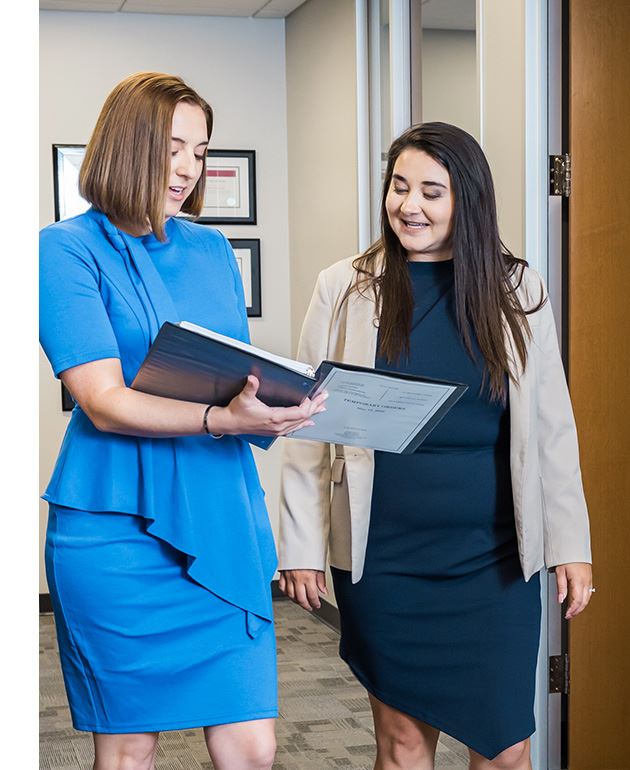Contact us at (512) 548-8355 to learn more about mediation in your case.
What is Divorce Mediation?
Divorce mediation in Texas is a process through which couples work with a neutral third party, known as a mediator, to reach agreements on various issues related to their separation. The mediator's role is to facilitate communication and assist the couple in finding mutually acceptable solutions without the need for court intervention. This process is particularly beneficial as it empowers both parties to directly contribute to the terms of their separation, often resulting in more personalized and satisfactory agreements.
Mediation is a confidential and voluntary process, meaning both parties must agree to participate. It is an alternative to traditional litigation and allows couples to have more control over the outcome of their divorce. The approach reduces adversarial tensions and facilitates a constructive dialogue, making it easier for both parties to focus on mutually agreeable solutions.
The mediator is a neutral professional who does not take sides or make decisions for the couple. Their role is to guide the discussion, help identify issues, and facilitate negotiations. With their impartiality, mediators can provide valuable perspectives that help in navigating emotional and complex discussions harmoniously.
Mediation typically covers a wide range of issues related to the divorce, including child custody and visitation, child support, spousal maintenance (alimony), division of property and assets, and any other matters the couple needs to address. This flexibility allows for a comprehensive approach, ensuring that all elements of the divorce are addressed systematically and effectively.
Divorce mediation is an integral part of settling family disputes amicably in Austin. With the local legal landscape emphasizing collaborative resolutions, mediation serves as a cornerstone for those aiming to avoid prolonged litigation. The Travis County Courts often encourage or mandate mediation, reflecting a community-wide preference for resolution outside the court system. At Diggs & Sadler, we align our mediation strategies with local standards to ensure our clients receive a process that's both effective and compliant with Austin's regulatory expectations.
Preparing for Divorce Mediation in Austin
Before entering mediation, understanding the process and preparing accordingly is key. We assist our clients by outlining expectations based on Austin’s unique legal environment. This may involve gathering financial documents, listing marital assets, and discussing preliminary parenting plans for couples with children. Preparing these elements beforehand ensures that sessions are more productive, with both parties ready to engage in meaningful negotiations.
In Austin, mediators often encourage a pre-mediation consultation to discuss the process, the roles of each party, and any preliminary issues that might arise. This step is invaluable in fostering a mindset oriented towards resolution and cooperation. Diggs & Sadler offers thorough pre-mediation sessions aimed at minimizing surprises and helping you approach the process with confidence and clarity.
How Divorce Mediation Works
During divorce mediation, you and your spouse will meet with a mediator, who will help you come up with a settlement agreement. The mediator will not give you advice or tell you what to do but will help you and your spouse come to an agreement. The mediator will also take time to explain the legal process to you and answer any questions you may have. Understanding the legal framework helps both parties to make informed decisions, ensuring that the finalized agreement is robust and sustainable.
During mediation, you will discuss all the issues in your divorce case and come up with a settlement agreement. If you are unable to reach an agreement, you will need to file for divorce and go to court. In this case, you will need to hire a divorce lawyer to help you. The process is designed to minimize the risk of litigation, but having legal advice during mediation can provide an added layer of security.
The Benefits of Divorce Mediation
Divorce mediation in Texas offers several benefits for couples looking to end their marriage more amicably and efficiently.
Here are some key advantages:
- Cost-Effective: Mediation is typically less expensive than traditional divorce litigation. Instead of paying for separate attorneys and prolonged court battles, couples can share the cost of a neutral mediator, which reduces legal fees and court costs.
- Time-Saving: Mediation often resolves divorce issues more quickly than litigation. Couples can schedule mediation sessions at their convenience rather than waiting for court dates, which can be delayed by crowded court schedules.
- Confidentiality: Unlike court proceedings, which are part of the public record, mediation is private. This confidentiality is beneficial for couples who prefer to keep their personal matters out of public view, preserving their privacy and reducing public scrutiny.
- Control & Flexibility: Mediation allows the couple to maintain control over the decision-making process. Rather than a judge deciding their fate, both parties work together to reach mutually agreeable solutions on matters like property division, child custody, and spousal support.
- Less Adversarial: Mediation is a more collaborative process. It helps reduce the conflict and tension often present in divorce litigation. This is especially helpful when children are involved, as it fosters a more cooperative atmosphere, promoting healthier co-parenting relationships.
- Customizable Agreements: In mediation, couples have the flexibility to create customized solutions that work best for their unique situation. This can lead to more creative and personalized outcomes compared to what a court might impose, offering solutions that are tailor-fit to specific family dynamics.
- Higher Compliance Rates: When couples have a hand in crafting their own agreements, they are more likely to comply with the terms. This reduces the need for future legal interventions to enforce the agreement, creating a more lasting peace between parties.
- Less Emotional Stress: Divorce mediation is generally less stressful than litigation. The process encourages open communication and problem-solving, which can help both parties manage the emotional challenges of divorce more effectively.
- Court Requirement: In Texas, some courts may require couples to attempt mediation before proceeding to trial, especially in contested divorce cases. This gives the couple an opportunity to resolve issues without the need for judicial intervention.
- Child-Focused: Mediation can be more child-centric, focusing on the best interests of the children. Parents are encouraged to work together to create a parenting plan that meets the emotional, educational, and social needs of their children.
In Texas, divorce mediation offers a less contentious and more empowering alternative to traditional litigation, giving couples the opportunity to resolve their issues efficiently and in a more peaceful manner.
Is Divorce Mediation Right For Me?
Divorce mediation is an ideal solution for couples who:
- Are not facing significant financial challenges
- Have children who are not yet 18 years old
- Are amicably separating and do not have a great deal of conflict
- Are looking for a fair and equitable settlement of all issues
Mediation is not for you if you are extremely angry or if you are considering matters such as domestic violence or child abuse. Mediation is not a good choice either if you are asking for a divorce based on fault or if you are asking for a divorce based on a no-fault ground. In these cases, the court will require you to participate in mandatory mediation. However, you can still request voluntary mediation. For those considering mediation, it is crucial to assess the level of collaboration possible between the parties to determine if this approach is truly beneficial.
Frequently Asked Questions
What Happens If Mediation Fails?
If mediation does not result in a settlement, the case may proceed to court. Should this occur, both parties will need to prepare for litigation. It is advisable to have a contingency plan if mediation does not lead to an agreement. At Diggs & Sadler, we discuss potential outcomes and ensure our clients are fully prepared to resume negotiations or proceed with court proceedings.
How Long Does the Mediation Process Take?
While the length of time spent in mediation varies depending on the complexity of individual cases, many mediations in Austin are resolved within just a few sessions. Factors such as the intricacy of financial divisions and the ability of both parties to communicate effectively can influence the duration. Our mediators work diligently to expedite the process without compromising quality, ensuring swift yet thorough settlements.
Can Decisions Made in Mediation Be Enforced?
Yes, decisions reached in mediation can be legally binding if both parties sign a mediated settlement agreement. This agreement, once signed, has the effect of a legal contract, and can be enforced by the courts if necessary. We guide our clients through each step to ensure all agreements are properly documented and enforceable, offering peace of mind and clarity.
Contact Our Austin Divorce Mediators Today
Our experienced mediators in Austin can help you work through all the issues in your divorce. We will ask you questions and get all the information we need about your case, and then we will come up with a strategy for you. We will help you figure out the goals and objectives you wish to accomplish and then come up with a plan to achieve them. By customizing our approach to fit the unique needs of each case, we aim to provide the most effective mediation experience for our clients.
Our goal is to save our clients time and money and to help them resolve their cases amicably and equitably. We are ready to help you. With a focus on clarity and communication, we strive to offer solutions that are not only effective but also emotionally considerate, ensuring that all parties feel heard and respected throughout the process.
Contact us today at (512) 548-8355 to request a confidential consultation.




